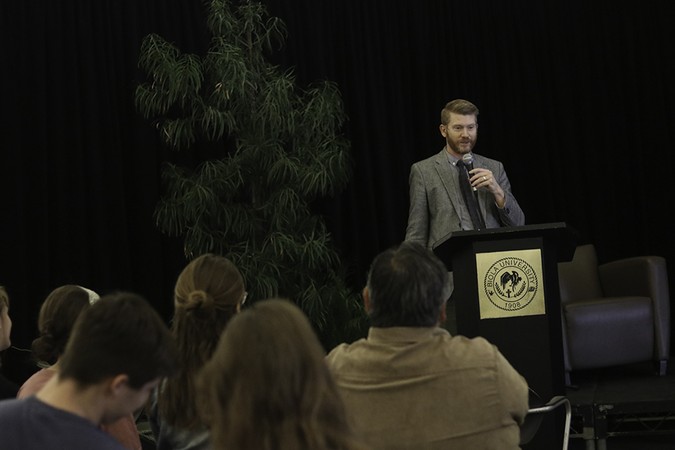The journalism and public relations department hosted their first “Culture and Media Talk” event alongside the communication studies department, which encouraged students to shape culture around them by including their beliefs in their art on Feb. 8.
CREATING CULTURE
The event is one of three that will occur during the spring semester, with each one aiming to educate students on faith in culture and media. The first event on “Culture Creation and Media” included a message from Brett McCracken, who currently works as the senior editor for The Gospel Coalitionand has also written three books and for various publications.
McCracken discussed the struggle between Christian and secular culture. McCracken feels the Christian community can better embrace culture around them by learning to love culture, rather than combatting it. He also talked about how Christians have a difficult time going into the world if they do not know the culture.
“Christian culture makers have tried to impact a world they don’t love,” McCracken said during the talk.
In his discussion, McCracken touched on what he called the “pendulum problem,” which involves Christians either embracing culture without regard to faith-based principles, or not embracing culture at all.
McCracken highlighted the importance of maintaining a balance in media evaluation. This also applies to society in general, where stating the ability to both appreciate and criticize something is becoming harder, according to McCracken.
“[We are] losing ability as a culture to praise a praiseworthy thing and critique a critique-able thing,” McCracken said. “Any critique is viewed as betrayal.”
FAITH INTEGRATION
When discussing the matter of integrating faith into art, McCracken emphasized the current issues in the faith-based creative world. McCracken touched on the fear of most Christians artists: that they will seem “didactic and preachy” if they integrate faith into their work, and therefore, abandon integration altogether.
McCracken encouraged students to pursue innovation as creative Christians and to avoid always aiming for relevance, which he considers stifling to art. Rather than trying to manipulate the content of one’s work, students should trust in the truth rooted in their faith and not aim to align with whatever is “trending,” according to McCracken.
In offering advice, McCracken stated that Christians need to remain generative and proactive rather than derivative and reactive. By aiming for innovation in culture creation and media and taking inspiration outside of social media, McCracken believes Christians can become the culture changers.
Students attending the event shared appreciation for McCracken’s emphasis on integrating faith into creating. Senior public relations major McKenna Boen said she felt challenged in this area after the event.
“The number one thing I got out of Brett’s CAM Talk was to be seeking beauty, not relevance,” Boen said. “I love how he talked about Christians shaping culture, rather than being shaped by culture, which is evidenced by what we create.”
Following the event, provost and senior vice president Deborah Taylor expressed support for having these types of conversations.
“I want to support… having these conversations at Biola,” Taylor said. ”I am concerned that its becoming harder for us to sit in spaces and talk about challenging topics and difficult things. We’re all very concerned about offending someone and are kind of stepping out of conversations we should be stepping into.”
Taylor discussed how McCracken’s perspective remains an important one to students.
“I really like the idea… of how do we bring our identity of faith to what we create, in whatever realm we’re creating,” Taylor said. “How do we raise up a generation of students, who bring fully what their faith is to what they do?”







